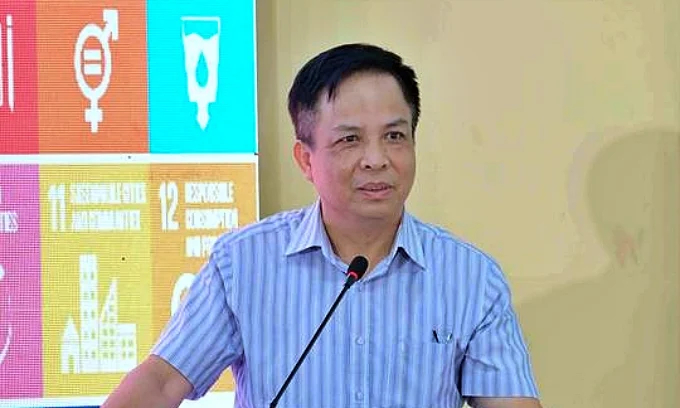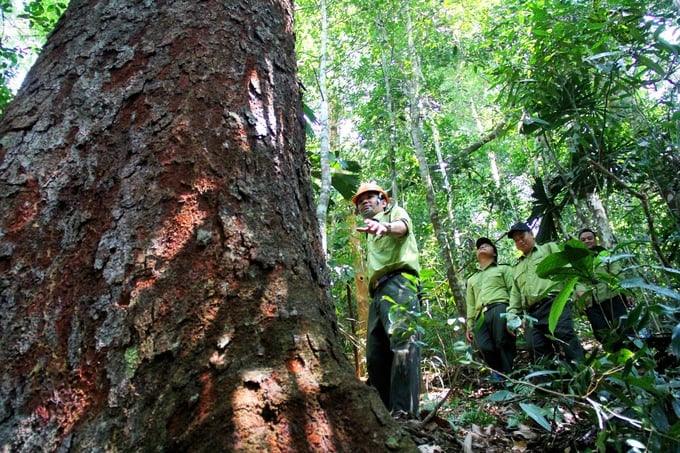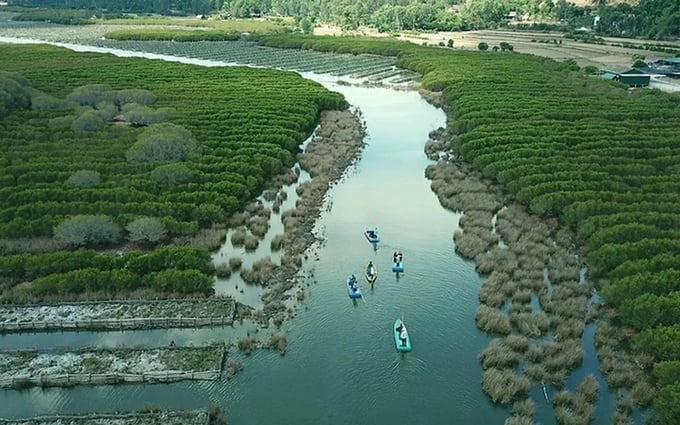May 17, 2025 | 09:56 GMT +7
May 17, 2025 | 09:56 GMT +7
Hotline: 0913.378.918
May 17, 2025 | 09:56 GMT +7
Hotline: 0913.378.918

Dr. Tran Dai Nghia, Institute of Policy and Strategy for Agricultural and Rural Development.
Vietnam submitted its second updated NDC to the UNFCCC Secretariat on November 8, 2022. According to this submission, by 2030, Vietnam aims to reduce emissions by 15.8% compared to the BAU scenario, which is equivalent to 146.3 million tons of CO2.
With international support, Vietnam will further reduce emissions by 27.7%, equivalent to 257.4 million tons of CO2, leading to a total reduction of 43.5% by 2030 compared to the BAU scenario. Specifically, in the agriculture sector, Vietnam is expected to reduce about 5.5%, equivalent to 50.9 million tons of CO2.
Dr. Tran Dai Nghia, Head of the Resource and Environmental Economics Research Department at the Institute of Policy and Strategy for Agriculture and Rural Development, notes that among various sectors, agriculture and forestry offer the greatest potential for emission reductions.
In a conditional contribution scenario with international support, Vietnam believes it can reduce emissions by 17.31 million tons of CO2 through the protection of existing natural forests in mountainous areas.
"These are ambitious targets," says Dr. Nghia. He adds that to effectively implement Decree 06 on reducing greenhouse gas emissions, as well as the NDC commitments, Vietnam needs effective tools for carbon pricing.
The emissions fee or incentive for investing in lower-emission technologies is built on three pillars. However, Vietnam is currently implementing only two of these: the cap-and-trade system and the carbon credit mechanism. At its current nascent stage, Vietnam primarily focuses on carbon credits.
There are two main types of carbon markets: compliance and voluntary. In a compliance market, organizations or countries purchase credits to meet national NDCs or comply with obligations under taxes or cap-and-trade mechanisms. In contrast, the voluntary market views purchasing credits as a public policy tool to encourage greenhouse gas mitigation actions or meet voluntary targets and commitments.

Vietnam has great potential for carbon credits but still lacks guidance and application technology.
The government has directed the Ministry of Finance, the Ministry of Natural Resources and Environment, and several other relevant ministries regarding the development of Vietnam's carbon market. However, the current roadmap is only planned up to 2028 and applies solely to the domestic market, with international trading still undecided.
Based on these analyses, Dr. Tran Dai Nghia suggests that Vietnam is currently best suited to participate in the voluntary carbon market. This market is the easiest to join, requiring less in terms of systems and technology, and does not involve quotas like the compliance market.
In exchange, participating in the voluntary market requires Vietnam to engage in international programs and projects. Through this cooperation, the country can access financing based on REDD+ results (a mechanism providing financial incentives to prevent deforestation and forest degradation, based on contributions from developed countries).
Another factor is that when participating in the voluntary market, Vietnam, like other countries, has a set period to sell carbon credits. If this period lapses, the system will automatically reduce the carbon credits for the project area to zero.
Analyzing the voluntary carbon market in detail, Dr. Nghia identifies five main components: businesses, government, private landowners, project developers, and other NGOs. Each component plays a distinct role.
Carbon credit transactions in the voluntary market occur through various channels, notably exchanges like Verra and Gold Standard. Each exchange provides specific requirements and rules to guide project developers in designing mitigation activities. For instance, Verra conducts baseline emissions assessments every 10 years, while Gold Standard does so every 5 years.
In 2023, Vietnam entered the voluntary carbon market and successfully transferred over 10 million carbon credits in the North Central region, with a unit price of around $5 per ton. Some opinions suggest that this price is quite low compared to transactions in the compliance market. However, Dr. Nghia emphasizes the need to understand the situation correctly.
"Vietnam cannot yet participate in the compliance market (where carbon credit prices are significantly higher) due to the lack of several factors, including bilateral agreements. We are not yet able to sell each carbon credit at prices of several hundred USD," he stressed.

The carbon market is expected to help Vietnam earn tens of millions of dollars.
To illustrate, experts from the Institute of Policy and Strategy for Agriculture and Rural Development outline 10 core principles of the voluntary carbon market.
He also noted that certain requirements, such as authentication, independent third-party verification, proof of sustainable environmental impact, and avoidance of double counting,... are big challenges for a young country, just entering the carbon market like Vietnam.
Nationwide, Vietnam has actively collaborated with various international organizations to implement emission reduction activities, with the aim of selling carbon credits.
In addition to the successful transfer of over 10 million tons of CO2 in the North Central region through the FCPF project, there is also the LEAF project with over 50 million USD in the Central South and Central Highlands regions; and the USAID-funded project that reduces emissions by 7.8 million tons of CO2 across seven provinces: Lao Cai, Son La, Hoa Binh, Thanh Hoa, Nghe An, Quang Tri, and Quang Nam.
Dr. Tran Dai Nghia gave five recommendations for the near future. First, complete the legal framework for operating domestic and international carbon markets. Second, develop a national and international emission reduction and registration system, with a priority on piloting in the forestry sector.
Third, prioritize projects that generate carbon credits. Fourth, develop more emission reduction, emission avoidance, and greenhouse gas absorption projects to access results-based financing sources (RBCF) such as TCAF, SCALE, LEAF, and GCF. In particular, carbon credit products must meet high quality standards.
Fifth, allow the forestry sector to experiment with carbon credit trading. Finally, the forestry sector should be permitted to trade (sell) carbon credits on voluntary markets with competitive pricing from ongoing and completed projects (such as FCPF).
Recently, several provinces such as Quang Nam, Son La, Lao Cai, and Thanh Hoa have proposed developing and implementing pilot projects for investing in and trading carbon credits. However, to date, these provinces have not been able to carry out these projects.
The Forestry Department has identified several reasons for this, including a lack of detailed regulations and guidelines for implementation, such as rules on forest carbon ownership, carbon trading and transfer regulations, management mechanisms, and the use of revenue from carbon credit services.
Additionally, the emission reduction quotas contributing to the NDC (Nationally Determined Contributions) targets and the potential for tradeable forest carbon credits in each locality have yet to be determined and allocated.
Translated by Phuong Linh
![Multi-channel, multi-directional Vietnamese agricultural markets: [7] Deep processing makes global reach easy](https://t.ex-cdn.com/nongnghiepmoitruong.vn/608w/files/huytd/2025/05/16/2946-che-bien-sau-chia-khoa-vang-nang-tam-nong-san-viet-tren-ban-do-the-gioi-080603_110-093858.jpg)
(VAN) The application of deep processing technology is helping Vietnamese agricultural products enhance their value, create competitive advantages, and open doors to conquer global consumers.
![Multi-channel, multi-directional Vietnamese agricultural markets: [6] Agri products go online](https://t.ex-cdn.com/nongnghiepmoitruong.vn/608w/files/content/2024/12/10/1-113313_954.jpg)
(VAN) Bringing agri products onto e-commerce platforms is an effective way to build a brand that many businesses, cooperatives, and agricultural production households are doing.

(VAN) Veterinary training should focus on quality, not just quantity. Veterinarians also need more options to pursue specialized training.

(VAN) The veterinary industry needs to be viewed objectively and further invested in to properly demonstrate its role and importance in the new context.

(VAN) The number of veterinarians graduating each year is not enough to meet actual needs, hence a difficult problem for the growing livestock industry.

(VAN) The strategic partnership between Cambodia, the Philippines, Vietnam, and CGIAR ensures that innovative solutions effectively address national priorities for food system development.

(VAN) This was affirmed by the UK Minister of State at the Department for Environment, Food and Rural Affairs during a working session with Deputy Minister Tran Thanh Nam on May 13.